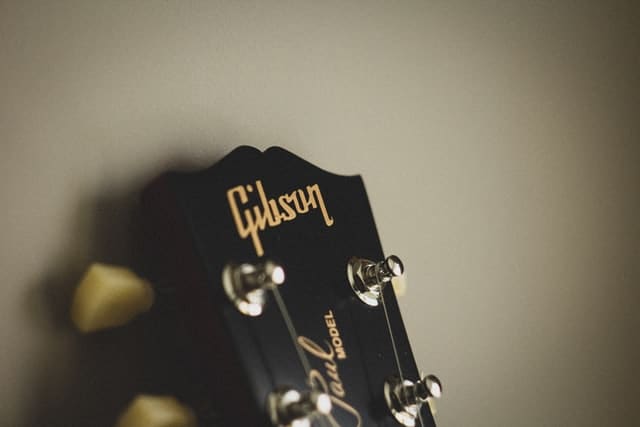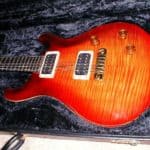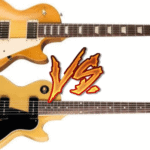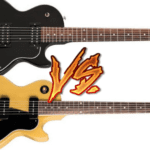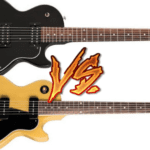Gibson guitars are known for their more expensive selling price and a lot of earlier models are now collector’s items. Some of the most expensive guitars in the world are Gibsons played by icons like Eric Clapton.
For the average guitar player’s Gibson, you’re not going to see an increase in value since mass-produced Gibsons are not collectible, but because of the quality that Gibsons are made at, and their brand awareness, they usually maintain most of their value.
Some models like the Gibson Les Paul and the Gibson SG retain around 85% of their selling value as second-hand guitars.
Most of the Gibsons made today are unlikely to become collector’s items though because models today are far too mass-produced to become rare enough to be collectibles.
Do guitars, in general, hold their value through time?
Yes, in general, most guitars will hold their value if they’re well taken care of. Guitars are built to last and most are made out of quality materials in general, even the mass-produced ones.
Guitars are even good investments if you understand the market for them well enough. Superior quality guitars even increase in value over time rather than depreciating.
There are a lot of factors that determine whether a guitar will hold its value or decrease in value over time.
Often the opposite can be true, meaning they will appreciate if they have some of these characteristics:
- Limited Production
- Quality
- Rare materials ( like Gold or Brazillian Rosewood)
- Unique production methods
- Fame
Collector guitars usually have most or all of these aspects, but most of your affordable-range guitars won’t increase as much. However, putting time into buying an upper-tier guitar usually means it will be more valuable in time.
Does that mean you should spend $5000 or more on your next guitar? No, I don’t think you should go out of your way to buy expensive guitars simply as assets, not unless you’re a collector.
The only benefit of getting expensive guitars if you’re not looking to use them as an investment is that their higher quality means they play way better than mass-produced $100 guitars.
Do used Gibson guitars depreciate?
Generally, any Gibson model will depreciate as most physical items do. It’s down to rarity and quality, but the good news is that they don’t usually depreciate much compared to other guitar brands.
An interesting look at the measured value of Gibsons over time found that in the first decade, they see a slight decrease in value and then begin to slowly appreciate. So, if you can hold onto your guitar for a while without damaging it irreparably, you may see its value regain.
You have to keep in mind that Gibsons are considered higher-end guitars and unlike most mass-produced brands, they have a lot of qualities that make each guitar, even in a model range unique. That is that they have a hand-made aspect to them.
People tend to appreciate that a lot more. Where you will see depreciation in your guitar’s value over time is where they’re made with more modern (CNC) methods that take away from the craftsman aspect. Some buyers are really hung up on “hand crafted” instruments.
There are Gibson models that use some more machine-fitted techniques, but they remain put together entirely by hand. Whether hand-made guitars are better than CNC guitars is a topic for a different post though.
What could make a guitar lose value?
Aside from whether or not it’s cheaply made, mass-produced, or poorly made. There are some other factors that affect guitar value.
For one, most people agree that American-made guitars are the best guitars, so Gibson, Fender, Washburn, Martin guitars, and so on are all considered high quality. This is because of the woods and materials they’re made of, but it’s also subjective as there are some good European guitar brands out there too.
Let’s say you own a Gibson or another high-end guitar, what else could happen to it that would depreciate its value? Aside from that ten-year dip, of course.
Poor maintenance
We’ve covered guitar maintenance in a couple of other articles and needless to say, it’s an important aspect of owning any guitar. From oiling the fretboard (not too much though) to cleaning the bridge to polishing the body. A lot goes into keeping your guitar in shape.
A lot can also go wrong during the maintenance.
Using cheap cleaning materials can mean scratches and discoloration or irreversible damage to parts.
Too much maintenance is also bad for your guitar, as you’ll just wear it down faster, or in the case of a fretboard, oversaturate it.
There’s also the aspect of a lack of maintenance. If you fail to maintain your guitar, no matter how good it is, it will lose its value over time. A neglected fretboard or rusty pickups will bring the value down on any guitar.
Misuse and Abuse
Then there’s outright mistreatment of your guitar. You’d be surprised how careless people can be with their instruments and while it’s often unintentional, it plummets the value of your guitar.
Have you ever spilled any beverages on your guitar? If so, you might find that it will leave a sticky residue or stain that just won’t come out and suddenly your guitar is “damaged goods.”
Swapping out original parts
Frankenstein was considered a monster for a reason. He may have been made of many men, but he wasn’t a man of his own and the same goes for a guitar you’ve just over-customized.
It goes with that age-old question of if you swap out all the parts of your guitar over time is it still the same guitar? Either way, an upgrade here and there makes it custom, but overdoing it will likely make your guitar lose value.
Poor Storage
Sometimes we don’t want to play our guitar every day. Sometimes you buy a guitar and it just feels so precious that you want to lock it away and keep it safe, and then one day you open it up and the fretboard is cracked and the neck is warped.
Improper storage, whether it’s for travel or a state of disuse, needs to be done properly or it could lead to just as much damage to your guitar.
When traveling, be sure to keep your guitar’s humidity in check and store it in a sturdy case. If you’re storing your guitar for a long period, you’ll need to take it out once in a while to maintain it regardless.
Are some Gibson models more sought after than others?
Definitely. Remember the fame aspect of a guitar?
Any guitar model that’s been owned by a famous player is usually very sought after and their value thus increases greatly.
The most sought-after models are generally pre-’60s models where the materials aren’t used anymore and the production amount was lower so they’re rarer.
The ten most sought-after Gibsons are:
- 1954 Gibson Les Paul Junior
- Gibson Explorer
- 1956 Gibson Les Paul Goldtop
- Gibson Flying V
- 1954 Gibson Les Paul Custom
- Gibson ES-335
- 1957 Gibson Les Paul Black Beauty
- 1961 Gibson SG
- 1957 Gibson Les Paul
- 1959 Gibson Les Paul Standard
Also, any reissue of these models is usually highly demanded.
Should you worry about your guitar losing its value?
Most guitars lose value over time, the question you’re more likely wondering is how much value?
Depending on the make and model of your guitar, it may see very little loss in value, considering that you take good care of it, that is.
Anything American-made tends to hold value quite well.
If you want to guarantee that your guitar will not only maintain value but even increase value, your best bet is to become a famous guitar player. Then, no matter what you’re playing, it’s going to be very valuable in a few years.
So with that being said, just remember to take care of your guitar and when the day comes that you consider trading it in or selling it, you’ll get a good return.

Hello there, my name is Ramiro and I’ve been playing guitar for almost 20 years. I’m obsessed with everything gear-related and I thought it might be worth sharing it. From guitars, pedals, amps, and synths to studio gear and production tips, I hope you find what I post here useful, and I’ll try my best to keep it entertaining also.

